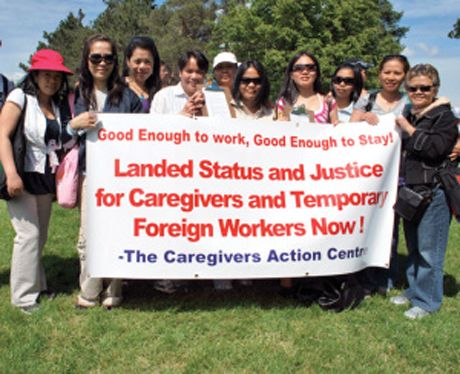News
You are here
Temporary foreign workers denied basic labour rights

December 2, 2012
After two high-profile incidents in northern British Columbia, Canada’s Temporary Foreign Worker Program (TFWP) has come under public scrutiny in recent weeks.
In the first incident, a group of Mexican workers filed a human rights complaint against their employer, the owner of a Tim Hortons franchise. The workers allege that they were forced to live in overcrowded housing and perform menial tasks, and were subjected to racial abuse. In the second incident, trade unions exposed the plans of HD Mining Ltd. to recruit hundreds of Chinese workers for a new coal mine development. The company claims it could not find workers with the required skills in Canada.
Since 2002, permanent immigration to Canada has remained at approximately 140,000, whereas the TFWP has tripled. It is estimated that over 300,000 TFWs are employed across Canada in the agricultural, service, food processing, oil, and manufacturing sectors. Jim Stanford, economist for the Canadian Auto Workers, argues that “temporary foreign workers…account for almost 30 per cent of all net new paid jobs created in Canada between 2007 and 2011…this represents the core of labour market strategy by employers and this obliging government.” Furthermore, recent changes in the TWFP allow Canadian employers to pay migrant workers up to 15 per cent less than Canadian workers.
Most of the low-skilled workers in the TFWP, which make up half of the workers in the program, are only allowed to work for the employer that hired them. Consequently, TFWs are often coerced into working long hours for little money and under deplorable conditions for fear of being deported if they complain. Ken Georgetti, President of the Canadian Labour Congress, states that: “We support people coming to Canada as landed immigrants to fill demonstrated skills shortages. But the government’s plan is unfair. It will simply provide low-wage labour to business at the expense of Canadian communities and migrant workers trying to provide for families they left behind.”
By pitting workers against each other, the TFWP controversy has the potential to generate nationalistic and xenophobic sentiments. However, the erosion of workers’ rights through the maximum exploitation of migrant workers is a class issue that transcends national borders. TFWs deserve all the rights and protections that Canadian workers have fought for, and the labour movement must fight to expand those rights to everyone.
Section:










